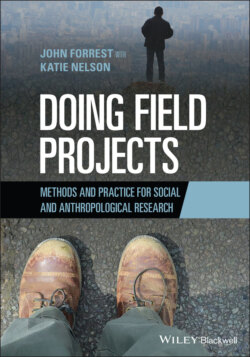Читать книгу Doing Field Projects - John Forrest - Страница 26
3 Ethics of Fieldwork
ОглавлениеBecause fieldwork is the study of people, following ethical principles is especially important. I address specific ethical issues as they arise in relation to the projects in this book and in each case I give detailed instructions and caveats. Here I want to underscore general ethical guidelines that are always applicable. These guidelines are in place both for the protection of the people you interact with, and for your own protection. First, consider the ethical guidelines established by the American Anthropological Association. The full text of the latest (2012) Principles of Professional Responsibility can be found here: http://ethics.americananthro.org/category/statement. This Statement is divided into sections that are self-explanatory and should be read in detail. Each section has a list of citations (with links) that you can also consult.
1 Do No Harm
2 Be Open and Honest Regarding Your Work.
3 Obtain Informed Consent and Necessary Permissions.
4 Weigh Competing Ethical Obligations Due Collaborators and Affected Parties.
5 Make Your Results Accessible.
6 Protect and Preserve Your Records.
7 Maintain Respectful and Professional Relationships.
You may also consult: Ethics and Anthropology: Ideas and Practice by Carolyn Fluehr-Lobban (Lanham, Maryland: AltaMira Press, 2013)
Not all the ethical points raised in the AAA’s Statement are germane to the projects in this book; they cover the full range of professional fieldwork endeavors. The following is a discussion of some of the key points that are most relevant to the projects in this book.
